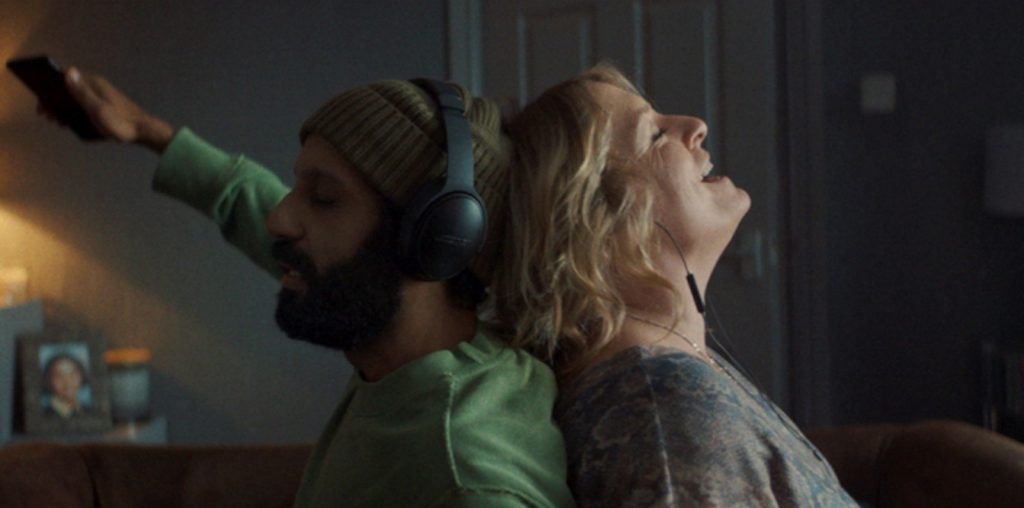
Here’s another “Big Chill” house. It’s spacious; with windows bringing in lots of light and it helps that occasional billowy white lighting makes it look like Japanese samurais will slowly step out, preparing for an unrelenting battle, one of many pleasant distractions. Rooms are big enough so characters can walk in and out, without the camera making much effort because after all, this is based on a play. One-shots are consistently used in an attempt to bring out more of the characters than the actors can, shortchanged by Robert Weston Ackerman’s script, based on his play, which is exactly as “The Big Chill” intended, because for every filmic imitation made after a notable movie is released (though “notable” is debatable), there is less and less quality.
This time, a group of late twentysomethings (Elon Gold, Jean Louisa Kelly, Michael Kelly, Jonathan LaPaglia, Amanda Peet, and Sybil Temchen) gather in upstate New York. As it is with any script based on “The Big Chill”, each character has to stand out, otherwise they’re of no use, and would be left for meat in case everyone got snowed in for weeks on end. Ah, fantasy. First there’s Paul (Gold), who can’t shut up for at least five minutes about Darwin and the amazing process of evolution. Why is he this way? Could it be that he loses what makes him what he is if he stops? Is there no originality left in this man? Julia (Peet) is his wife, tolerating her husband’s passion as much as possible, asking him as he steps up from the lake if he will at least curb it for this one weekend when they and their friends come together again. It’s a yearly tradition among them, meeting at Paul’s mother’s summerhouse in upstate New York. Who would want to hear about Darwin anyway when there’s so much else to think about, like problems you wouldn’t wish on your most tepid buddy for fear they’d end up sounding this tired? They’re the type of problems you could speak in one sentence without stopping and it would be understood.
Stan (Jonathan LaPaglia), who recently overcame testicular cancer, likes his band of friends, but feels they just can’t come close to what he is now. Kate (Sybil Temchen), Stan’s ex, didn’t treat him so well during his illness. Her friend Laura (Jean Louisa Kelly) is now after Stan, believing that he is the one she will fall in love with during the weekend. Distance, romantic idealism and oh yes, “Origin of the Species” wouldn’t be that kind of movie without a pregnancy surprise that isn’t much of a surprise. Naturally, with Julia being reluctant at first to tell Paul, we couldn’t expect any less than there being absolute uncertainty. Plus, we’re trapped in this house along with them. The actors are placed geometrically near each other, diagonal at times so the camera can capture them easily. Plus, the camera doesn’t move too often. When there’s a scene, there’s a scene. If you want to get closer to Julia and voice-over artist Fisher (Michael Kelly) as they walk towards the camera from the other side of the backyard, stick your head into your TV. This is true theatrical form. Everyone tries to make do with who they are. Amanda Peet tries to be subtle, but she comes off as blank. The rest are as you expect. It’s enough to simply follow the emotions that Ackerman has written. “Written” is key because nothing is felt here. Stephen Kazmierski’s cinematography represents what all of this fails to be. There’s calm beauty at the house, a desire to dig even deeply, and a wish to be so much more. Don’t bank on it with “Origin of the Species”. Instead of the thirtysomethings of “The Big Chill” we now have these men and women. They want to know how they will leave their young ages. They might be scared, but it doesn’t show. There are outbursts right when you’d expect them. When Kate is with Stan, you know exactly when Laura will spot them. These aren’t characters. They’re merely functions for words.
“Origin” was made in 1998, but got a DVD release earlier this year, so it’s comforting to know that Peet rose above Julia with Cynthia Banek in the emotionally shattering “Changing Lanes”. Jean Louisa Kelly is now best known as Amy Warner on “Yes, Dear”, and Gold, LaPaglia (brother of Anthony), Michael Kelly, and Temchen go where the work takes them. Success isn’t relative here anyway. Neither is this umpteenth rehash of “The Big Chill”. Change the elements as much as possible, but it still feels like that one. Set it in today’s times, and there’s nothing. It feels hollow. Drama without drama.
